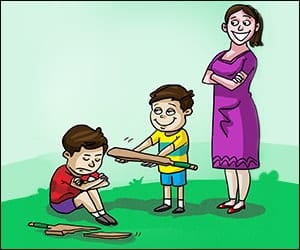 Knowing how to paint does not make you a painter, but you can’t be a painter unless you know how to paint!
Knowing how to paint does not make you a painter, but you can’t be a painter unless you know how to paint!
Wondering what this is about?
Mathematics is a compulsory subject in school, at least till your child turns 16–which means every child has to learn Math. However, that does not mean that every child needs to become a mathematician.
RELATED: 8 Reasons Why Kids Dislike Math
There are logical reasons why Maths is facilitated to every child. It’s an enforced topic and most of us don’t understand why.
Thus, here are 10 surprising ways to explain how Maths benefits your child:
1. Passion
“Playing with numbers is an art,” says Debarati, mother to two kids and a Mumbai-based Mathematics teacher.
She explains that Math provides passion. Since it’s an art, once you get it, the thrill of solving the mystery behind those numbers is never-ending. You just can’t get enough of it. It instigates passion and excitement in children that paves a way for passionate adults.
Take pride in the force that is Math since it can lead to a very avid child!
2. Sudoku, Monopoly, Business…
“She’s no mathematician! Shanaya is as averse to arithmetic as most people are to bitter gourd,” laughs Rina. I just called her seven-year-old a mathematician on solving the Sudoku successfully and this is her answer.
Makes me wonder–Shanaya doesn’t like Math. Yet she likes playing math games. Is that any different from liking Maths?
Math helps in making the regular things in life, fun, and difficult games like Sudoku and Monopoly, easy. A surprise benefit of learning Math, (even if forcefully), isn’t it?
3. Creativity
“What has origami got to do with that?” asks Shruti. The seven-year-old has made a paper bird and her teacher tells her that it shows brilliant calculation.
“Origami is nothing but a variation of geometry. You can say, it’s 3D geometry,” chuckles Shruti’s teacher.
She says that most parents don’t understand that creativity springs as much from Math as it does from natural instinct. “What’s an architect without angles? What’s a singer without scale? What’s a tailor without measurements?” she asks.
I believe her. Creativity does find its roots in Mathematics. A revelation, don’t you agree?
4. On the road
“Can you PLEASE go slowly?” I plead as my husband rushes down the highway. I dislike speeding, but our son loves it.
To add fuel to fire, my four-year-old expertly uses my husband’s reply and says, “Mamma, he’s just at 60!”
Mileages, automobiles, distance, time to reach, speed-per-kilometre, and so on. Every road-fact has Math.
It makes your kid ‘road’ smart, doesn’t it?
5. Confidence
“When you know Math, you’re confident. When you struggle with it, you struggle with confidence too,” said the curriculum head at my son’s school. I was speaking to her about the insistence upon numbers even at a young age.
It came as a surprise to me. I always believed that confidence had nothing to do with Maths. Perhaps, it doesn’t entirely, but partially it does. If you’re good at Mathematics, you become more confident.
The teacher concedes by saying, “Making Math a fun and important part of kids’ lives improve their confidence in various other things as well. Basically, it just makes them proud.”
This was news to me!
6. Conversation
“I think my favourite number is 5. What’s yours and why?” Six-year-old Jai asks Amita this during our moms-and-kids potluck party. All of us laugh, but he has a point. Why is a certain number our favourite?
Intelligent Math inquisitions make for excellent conversation. Children can talk about what they understand and like about Mathematics, instead of the regular “Sing that song you learnt for school,” display that we usually make them do.
An unexplored perspective, isn’t it?
7. Hobbies turn real
“You need to know things like velocity, speed, astronomy, and thermodynamics for this. Right now let’s work only with paper, okay?” Asks my husband, a self-confessed scientific bookworm!
“What will he understand of all these big words you’re telling him?” I ask.
My four-year-old loves making rockets. Although the paper ones he now makes don’t fly, I hope that one day they would.
“He needs to like these ‘big words’ to make his hobbies real. You never know soon there’ll be a rocket flying out of our window!” my husband concludes and I agree. Math will help his hobbies become more prolific.
8. Salary, pay, self-worth
Although they say that self-worth has nothing to do with the money one earns, one should be able to calculate how much his/her work is worth in terms of money.
Confused? Let me explain. Although we don’t want children to be greedy, there’s nothing wrong in being able to calculate the monetary value of things. That’s where Maths plays a key role.
Children who grow up with a knack for Maths are more likely to be prudent about value for work than those who take numbers for granted.
Maths makes children judicious and that’s something all parents want. Agreed?
9. Practice makes perfect
“C’mon Ammi! That’s different,” says eight-year-old Farhan.
His mom has just told him that he can try gymnastics just like he practices Maths. Both of them require calculated moves. He’s having a tough time considering it.
“Well, I think that Math is a calculative game that improves with practice. So is gymnastics!” exclaims mom Sarah.
“Just like kids understand that Math clicks only with practice, they should be made to understand that complicated sports also click only with practice. Why tell them Math is like sports when the truth is that sports are like Math?” she concedes.
She has turned the usual logic around and it does sound interesting and new.
10. Universal logic
“I don’t speak Marathi,” I said in Hindi to the vegetable vendor who rattled vegetable names in Marathi. He got that and we started the pointing game. I pointed to a vegetable and he told me the price. It hit me then (perhaps because I’ve been thinking about this blog so much,) logic is universal for Maths.
Language has no bar for the rationale called Math. Although, two into two is four for us (quatre in the French,) the logic remains the same.
Mathematics has universal application and that’s a benefit none other can surpass!
Did you discover surprising things about Mathematics with your child? Share your experiences with us in the ‘Comment’ section below.







Smita rai
Thanks to flinto box